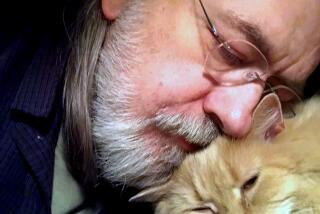The wild boy wants his fangs in Stephen Graham Jones’ “Mongrels”
- Share via
If all you know about angsty young werewolves comes from “Twilight” and “Teen Wolf,” you might want to check in with Stephen Graham Jones. In “Mongrels,” the ever-innovative Jones — author of more than 20 books and even more stories, spanning a range of genres — presents a gory monster of a coming-of-age tale that makes love triangles with sparkling vampires seem like trivial concerns.
Jones’ unnamed narrator is a born outsider, living on the fringes with his aunt Libby and his uncle Darren, the triplets of his mother, who died the day he was born. As a child, he absorbs the stories of his grandfather, most of which revolve around being a werewolf. He loves these stories, even without evidence of their truth. “This is the way werewolf stories go. Never any proof. Just a story that keeps changing, like it’s twisting back on itself, biting its own stomach to chew the poison out.”
When his grandfather dies midtransformation — “wolfing out” being a young man’s game — the narrator recognizes the shiny scars on his own forearms for what they are: the pale traces of his dewclaws.
From then on, he anticipates his transformation with the avidness and increasing anxiety of a teen girl waiting for her period — “To wolf or not to wolf, that was the question.” His uncle is a proud, virulent werewolf (with a penchant for strawberry wine coolers), but his aunt is more ashamed of their blood and burdened by the unstable lifestyle it necessitates. “For Darren, shifting that first time, it was the dream coming true. For Libby it was the nightmare, starting.”
The narrator’s mother never transformed, so despite his dewclaws, there seems to be some chance that his werewolf genes never manifest. While his aunt hopes for this outcome, the narrator longs to join the clan, to become like the uncle he so adores. “If you’re not a beautiful monster, then you’re a villager,” Darren tells him. It’s the kind of thing an impressionable boy might take to heart.
The werewolf family lives a wandering hardscrabble existence, going from town to town in the American South — snow being bad news for mythical creatures who leave footprints — moving whenever they give the local villagers reason to pick up their pitchforks and torches (often, very often).
Darren and Libby take low-paying jobs of varying legality while the narrator attempts to go to school without the benefits of valid paperwork or educational continuity. Unfortunately, it’s not quite easy for them to keep a low profile — they clash with law enforcement and other werewolves; they leave suspicious scat and get caught in compromising positions at desecrated graves. Yet both Darren and Libby do plenty of killing — something the narrator never refers to as murder, even when it’s premeditated. They’re always on the run because they cannot or will not contain their natures: “The wolf, it always claws its way to the surface.”
And it’s fascinating when it does, not just for the bloodshed but for Jones’ new mythology. His werewolves aren’t the howling lunatics of the movies — “Mongrels” presents an innovative, comprehensive new guide to werewolves, one that nods at tradition (silver is still killer) but becomes something wholly original and contemporary. These werewolves mask their canine breath with mints; their urine doubles as pesticide; they’ll die if they transform while wearing pantyhose, or if they leave empty cans in the garbage to choke on with their food scraps (“The modern world, it’s custom-designed to kill werewolves.”)
It’s a pleasure to watch the narrator sorting out truth from myth as he grows older — in this way, he’s like the rest of us, sniffing out the lies adults tell about adulthood as we go along.
Part of the appeal of monster tales is that they underline what it means to be human, and “Mongrels” is most poignant when the narrator’s werewolf concerns align with recognizable anxieties. “I … listened with every part of my body,” he says when he feels cornered in a classroom. “It’s a special ability known only to werewolves and fourteen-year-olds.” And of course, romance is rather complicated for a young werewolf awaiting his transformation.
The book contains plenty of humor, but it’s also enormously violent and dark. “People say werewolves are animals, but they’re wrong. We’re so much worse. We’re people, but with claws, with teeth, with lungs that can go for two days, legs that can eat up counties.” Incidentally, if you’re squeamish, this may not be your ideal beach read.
But even the spirited bloody horrors don’t save the novel from stagnating at times. “Mongrels” offers a slide show of the narrator’s life between ages 7 and 16, composed of a series of sequential set pieces interspersed with short vignettes that jump around in time. The individual chapters are compelling, but this episodic structure gets in the way of the novel’s momentum — there’s almost no swell to the action and the episodes could be reordered without really hurting the narrative; even the narrator’s emotional concerns stay more or less the same throughout.
Still, Jones makes quite an impression with “Mongrels,” putting a distinctive mark on both werewolf lore and coming-of-age fiction. It’s a thoughtful, entertaining novel with rich details, well-drawn characters, and, if you’ll forgive the phrase, plenty of bite.
Cha is the author, most recently, of the novel “Dead Soon Enough.”
::
“Mongrels”
William Morrow: 320 pp., $24.99
More to Read
Sign up for our Book Club newsletter
Get the latest news, events and more from the Los Angeles Times Book Club, and help us get L.A. reading and talking.
You may occasionally receive promotional content from the Los Angeles Times.








